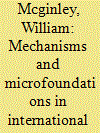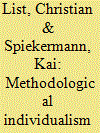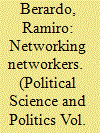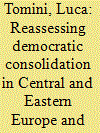|
|
|
Sort Order |
|
|
|
Items / Page
|
|
|
|
|
|
|
| Srl | Item |
| 1 |
ID:
131711


|
|
|
|
|
| Publication |
2014.
|
| Summary/Abstract |
This article looks at prospects for a mechanism-based research strategy in the study of International Relations. Over the past three decades, the notions of mechanism and microfoundation have taken a central place in discussions of explanation and 'micro-macro' problems in social science. The upshot of much of this discussion has been a call for mechanism-based explanations - explanations of macro-level phenomena in terms of micro-level mechanisms. Some work of this kind can already be found in IR theory, including in systemic research. However, a number of IR theorists, including Kenneth Waltz and Alexander Wendt, have argued that micro-oriented strategies like this will not work, pointing to incongruities between system- and unit-level phenomena. This article argues that these pose less hindrance to a fully-developed model of mechanism-based explanation, and that the field has much to gain from further exploration of this strategy. In particular, mechanism-based explanations could help bring structure back to the centre of discussion in IR theory, and might even give us a way out of the field's own micro-macro problems.
|
|
|
|
|
|
|
|
|
|
|
|
|
|
|
|
| 2 |
ID:
127822


|
|
|
|
|
| Publication |
2013.
|
| Summary/Abstract |
Political science is divided between methodological individualists, who seek to explain political phenomena by reference to individuals and their interactions, and holists (or nonreductionists), who consider some higher-level social entities or properties such as states, institutions, or cultures ontologically or causally significant. We propose a reconciliation between these two perspectives, building on related work in philosophy. After laying out a taxonomy of different variants of each view, we observe that (i) although political phenomena result from underlying individual attitudes and behavior, individual-level descriptions do not always capture all explanatorily salient properties, and (ii) nonreductionistic explanations are mandated when social regularities are robust to changes in their individual-level realization. We characterize the dividing line between phenomena requiring nonreductionistic explanation and phenomena permitting individualistic explanation and give examples from the study of ethnic conflicts, social-network theory, and international-relations theory.
|
|
|
|
|
|
|
|
|
|
|
|
|
|
|
|
| 3 |
ID:
102070


|
|
|
| 4 |
ID:
097628


|
|
|
|
|
| Publication |
2010.
|
| Summary/Abstract |
Penn State's decision to eliminate political theory set off existential angst about the status of political theory in the discipline. The organized, defensive responses to that decision failed to answer the central question it posed: Is "political theory" social science, and if not, why does it belong? I argue that social scientific political theory is political science and its many strains-conceptual, normative, and explanatory-belong in the discipline on their own terms. Humanistic research, like dermatology or music theory, is not political science and as such it should find another home. By explaining why (and what kinds of) political theory is political science this article may wind up being offensive in both senses of the word. But it is meant to be in service to a more secure, stable, and productive interdisciplinary future for all kinds of political theory going forward.
|
|
|
|
|
|
|
|
|
|
|
|
|
|
|
|
| 5 |
ID:
132940


|
|
|
|
|
| Publication |
2014.
|
| Summary/Abstract |
Over the past two decades, the countries of Central and Eastern Europe have completed a long transition from authoritarian rule, and joining the EU has been considered to be an indication of the end of the consolidation process. However, this path was anything but linear and in many cases it was marked by concentration and abuse of executive power, a systematic political patronage and a plebiscitary interpretation of democracy. In order to shed light on the meaning of these phenomena, this paper provides for an analysis of democratic consolidation in these countries by way of comparing the cases of Bulgaria, Poland and Slovakia.
|
|
|
|
|
|
|
|
|
|
|
|
|
|
|
|
| 6 |
ID:
078067


|
|
|
|
|
| Publication |
2007.
|
| Summary/Abstract |
The article develops an approach to the study of modular political phenomena (action based in significant part on emulation of the prior successful example of others), focusing on the trade-offs between the influence of example, structural facilitation, and institutional constraints. The approach is illustrated through the example of the spread of democratic revolution in the post-communist region during the 2000-2006 period, with significant comparisons to the diffusion of separatist nationalism in the Soviet Union during the glasnost' era
|
|
|
|
|
|
|
|
|
|
|
|
|
|
|
|
| 7 |
ID:
172537


|
|
|
|
|
| Summary/Abstract |
Strategic voting is an important explanation for aggregate political phenomena, but we know little about how strategic voting varies across types of voters. Are richer voters more strategic than poorer voters? Does strategic behavior vary with age, education, gender, or political leaning? The answers may be important for assessing how well an electoral system represents different preferences in society. We introduce a new approach to measuring and comparing strategic voting across voters that can be broadly applied, given appropriate survey data. In recent British elections, we find that older voters vote more strategically than younger voters and that richer voters vote more strategically than poorer voters, even as strategic behavior varies little across the education level. The differences in strategic voting by age and income are smaller than observed differences in turnout by age and income, but they tend to exacerbate these better-known inequalities in political participation.
|
|
|
|
|
|
|
|
|
|
|
|
|
|
|
|
|
|
|
|
|